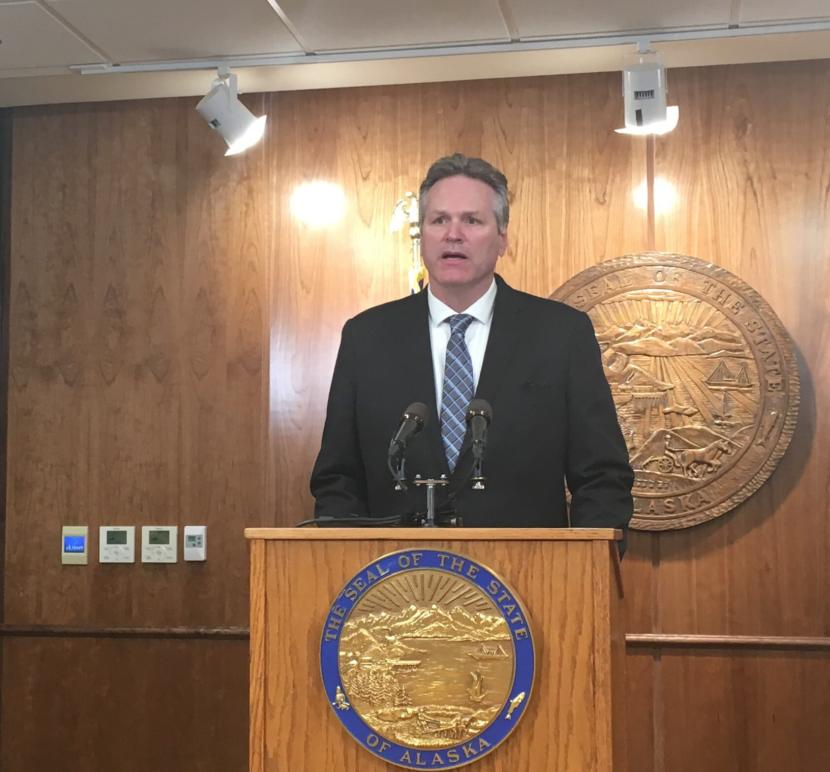
The Alaska Legislature failed to pass a budget or a crime bill Wednesday, the last day of the 121-day session. But it will pick up Thursday where it left off, after Gov. Mike Dunleavy called the Legislature into a special session.
Dunleavy’s call for the session focused on three budget bills, education funding, and criminal justice legislation.
“These are crucial elements in our opinion, and I think in the opinion of most Alaskans, that needs to happen sooner than later,” he said.
The Legislature didn’t resolve differences over the size of permanent fund dividends. They also must decide how much to transfer from permanent fund earnings to the fund’s constitutionally-protected principal.
Dunleavy said dividends must be the roughly $3,000 they would be under a 1982 state law. But current state revenue isn’t enough to cover both full dividends and the versions of the budget passed by the House and Senate.
The PFD is the last piece of the operating budget that hasn’t been resolved.
A conference committee on the budget agreed on nearly every item, including cutting the university budget by $5 million rather than the $134 million cut proposed by Dunleavy. It voted to reduce state funding for the Alaska Marine Highway System by $40 million, which would lead to greatly-curtailed service. And the committee voted to fully fund school bond debt reimbursement to municipalities.
There are three potential ways to close the roughly $1.2 billion gap between state revenue and the total cost of dividends and the operating budget: budget cuts on the scale proposed by Dunleavy; new revenue; and drawing from savings.
The largest savings account is the permanent fund’s earnings reserve. But drawing from the earnings reserve in an amount larger than planned under a law passed last year could threaten the long-term health of the earnings reserve. And it would diminish the amount available for both dividends and state government in the future.
The Legislature could also vote to change the PFD formula to lower dividends. But Dunleavy and some lawmakers oppose such a change without a vote by the public.
Lawmakers appeared close to an agreement on a crime bill. But they ran out of time to pass the bill before the regular session’s end.
The Senate’s version of House Bill 49 would go further than the House version in repealing elements of a controversial three-year-old criminal justice law known as Senate Bill 91.
How to fund public education also is on Dunleavy’s call for the special session. The Legislature maintains that a law it passed last year provides for funding over the next year. But Alaska Attorney General Kevin Clarkson issued an opinion saying that the Legislature must appropriate the money in this year’s budget bill for the state to send funding to districts.
These interconnected challenges proved too difficult for lawmakers to resolve in a session that got off to a particularly slow start. The House didn’t organize for the first month, as Kenai Republican Rep. Gary Knopp held out for a bipartisan coalition. And Dunleavy didn’t submit a budget with his policy proposals until Feb. 13.
Knopp and seven other Republicans ultimately joined with 15 Democrats and two independents to form a House majority. But time ran out on budget and criminal justice legislative talks.
Lawmakers won’t receive per diem allowances at the start of the special session. That’s due to a law enacted last year that cuts off these payments to lawmakers when they fail to pass a fully-funded operating budget by the 121st legislative day.
Dunleavy said he considered holding the special session in the Matanuska-Susitna Borough. But he decided to keep the Legislature in Juneau.
The special session can last up to 30 days.
Watch the latest legislative coverage from Gavel Alaska:
